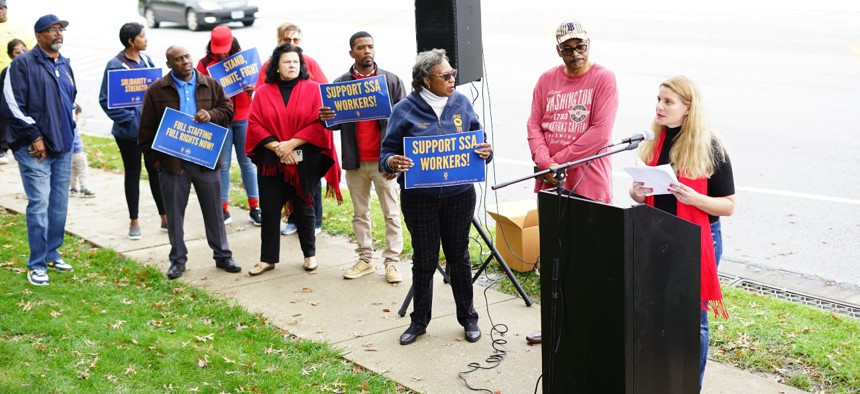
Jessica LaPointe, president of AFGE Council 220, which represents SSA field office and teleservice center employees, speaks at a rally for funding, collective bargaining rights and training. Chelsea Bland / AFGE
Social Security Union Rallies Outside the Agency's Headquarters for Funding, Bargaining and Training
An internal survey conducted by the American Federation of Government Employees found that 4 in 10 field office respondents are considering leaving the agency within the next year.
Members of the nation’s largest federal employee union on Wednesday rallied outside of the headquarters of the Social Security Administration near Baltimore, demanding more funding and staffing for the agency, as well as reform of agency leadership and workforce policies.
Last week, leaders from the American Federation of Government Employees’ unions representing Social Security employees outlined their proposal to provide the agency with $16.5 billion in emergency spending to rapidly hire new workers and urged management to pursue a more collaborative approach with labor groups.
Despite executive orders and other policies adopted by President Biden aimed at improving labor-management relations in the federal government, management at Social Security has been repeatedly accused of perpetuating Trump administration-era policies by refusing to revisit elements of the agencies’ 2019 collective bargaining agreement and slow-walking negotiations over contract articles that they did agree to reopen.
Union officials on Wednesday described an agency in a vicious cycle, where insufficient funding amid growing workloads has led managers to micromanage overworked and underpaid employees, burning them out until they quit, further increasing the output expectations on the dwindling workforce that remains. This is exacerbated, they said, by a refusal to act to modernize the agency’s workflows or provide workplace flexibilities that have become the norm not just in the private sector, but elsewhere in the federal government.
“Managers often resort to tactics of micromanagement and excessive monitoring in order to control the impossible workloads,” said Jessica LaPointe, president of AFGE Council 220, which represents agency field office and teleservice center employees. “Employees are concerned that they are not seen as human beings, but rather insignificant cogs in a machine. Many feel hurt by managers’ lack of compassion for major life events like the death of a spouse or the health challenges of a child, feeling that leave policies are used as a weapon to enact force, rather than a tool to effectively manage.”
Partially fueling the staffing crisis at Social Security, union leaders said, is the fact that many other federal agencies, such as the Veterans Affairs Department, offer better work-life flexibilities, including telework, as well as better pay for positions with similar responsibilities.
According to a survey of union members commissioned by AFGE Council 220, 43% of respondents reported that they were planning to leave the agency within the next 12 months, including 26% of respondents who said they were strongly considering it. And 76% of respondents said that the volume of their workload is an impairment to their ability to perform their duties.
Kenya Phillips, chief steward for AFGE Local 3610, which represents Office of Hearings Operations support staff in Virginia, described a steady decline in the agency’s training and career development offerings since she joined the agency in 1989.
“I don’t necessarily want to become a writer and I don’t have computer technician skills, so I’m basically stuck unless I can afford to earn a college degree with a broader range of opportunities,” she said. “With my assigned workload, many times I believe I’m unable to take advantage of the career development options that the agency does offer, or even feel comfortable talking to a manager about ways to advance, because I’m overwhelmed with my current duties. Or I worry that if I sacrifice my work to advance in my career, I’ll be penalized for not completing my assigned duties.”
Social Security spokesman Mark Hinkle told Government Executive last week that the agency is proud of its record on labor-management issues, citing nearly 50 mid-term contract agreements since Biden took office last year.
“We engage often with our employee unions to meet our bargaining obligations,” he said. “Under Acting Commissioner [Kilolo] Kijakazi’s leadership, we were one of the first federal agencies to reach agreements with all our unions on reopening our offices earlier this year, we have reached 47 mid-term agreements with our labor unions, and we secured collective bargaining agreements with two of our unions and will begin renegotiation with our third.”
But Angela Digeronimo, president of AFGE Local 2369 and New York regional vice president of Council 220, said management has either refused or ignored union proposals to modernize the agency’s workplace, including demands to renegotiate a draconian telework contract article imposed by the Trump-era Federal Service Impasses Panel as well as proposals to reform processes that often fuel long lines at field offices.
“We’ve proposed common sense policy changes, like utilizing existing interfacing with other agencies such as Immigrations and Customs Enforcement to verify [beneficiaries’] lawful presence [rather than requiring them to bring original paper documents to an agency office] to process benefits and to provide the same proof of age tolerance afforded to citizens,” Digeronimo said. “Even the simplest of our proposals—to allow beneficiaries to start, stop and change their voluntary tax withholding through MySSA has been met with resistance . . . They were given these proposals almost one year ago, but they still say they are ‘considering’ these proposals.”







